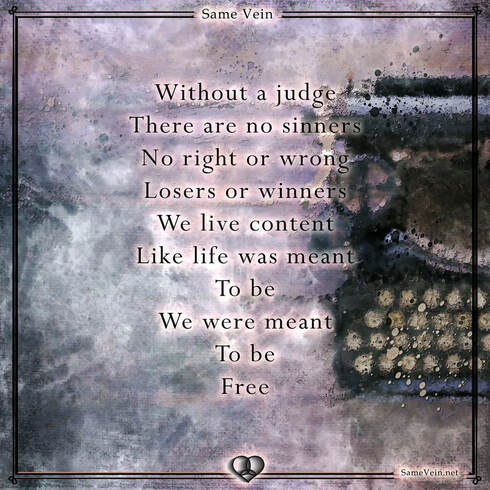PERSONAL EXPERIENCE blog | POETRY & ART | LIFE, DEATH, Growth & LOVE
"... What I think is important, and what the take away is, is that we need to stop blindly judging and become more aware of when and how to do it, as doing it is inevitable. ..." Judging others is pretty uncool. That is something I think the vast majority would agree with without even thinking about it. Just as vast are the amount of quotes and clichés I could fill this post with saying just that. Being said, given some heavy meditation and studying on the subject throughout the years, the amount most tend to judge and the reasoning behind it does not seem to align with everyone believing that it is pretty uncool. I am certainly no exception. Why do we all at first openly agree that we should not judge to begin with? Many of us were just raised that way, and their parents raised them the same as well, and so on. Most spiritual, religious, and just general culturally beliefs ask us not to judge too. It is not uncommon to hear "don't judge" as a comeback anytime someone makes an assumption towards another, typically negatively. Making judgements is simply frowned upon most of the time most anywhere you go. Even judges face a ton of criticism no matter what decisions they make and that's their job. Imagine someone preaching the exact opposite, promoting judgement as a whole; probably would be a tad bit taboo. I won't go that far ,despite the extremist I am, but I will defend judgement to an extent and hopefully not come off as a completely dense half-wit. As I hinted at, I feel the clichés have simply made the concept lose all meaning. Much like saying "I love you" can have it lose its passion. When you start expressing your love so simply as a mere reflex or habit without actually having any thought behind it, then the power behind it becomes dull and lifeless. Same with "don't judge others". Everyone knows they shouldn't as it is heard and said all the time, but many don't really think about it. Whenever someone has an initial opinion of someone based on how they look or act, or when someone has a variety of choices to make and they make an assumption and picks one. The list goes on endlessly, both big and small. Your entire day asks you to make judgements. This post in itself is based around judgments I have made about judgements. Buddha himself says "How do you know the complexity of human character?” …whoever judges others digs a pit for themselves.” We all make judgements but are quick to say judging is bad. So are we all bad? Probably not. What I think is important, and what the take away is, is that we need to stop blindly judging and become more aware of when and how to do it, as doing it is inevitable. When a stranger comes at you, you must judge them. Imagine not doing so and no matter how shady they look, you simply reserve all judgement even though they have a knife in their hand and you end up getting attacked. You are not "enlightened" for this, you're just foolish. Yes, perhaps they just had an urgent question but was recently witling something with their knife, but let your experience guide you and judge them and the situation accordingly. Tibetan teacher, Chogyam Trungpa Rinpoche, coined the concept of Idiot Compassion, describing when those in troubling and trying times attempt too hard to display compassion only to allow others to walk all over them. I have a history with that specifically, but for now, let me briefly summarize my personal experience with judgment. Without a judge This poem is the chorus to my song, "Just a Thought," and the entire song is exactly that. Not quite idealist or naïve, nor anything I believe or don't believe, but rather simply, just a thought. A world with zero judgement does sounds freeing, and with the amount of judgement I have experienced and seen, it becomes hard not to fantasize about it. Growing up, I was considered a heavy drug user and a general good-for-nothing up-to-no-good rapscallion or whatever negative word for youngsters was being used at the time. I have never done drugs, and if by up-to-no-good they meant getting straight A's, having jobs since before I was a teen, volunteering for charity, and generally just trying to get by, then yes, I was up-to-no-good. I wasn't a perfect kid at all, but I was pretty well behaved and out of trouble. Couch surfing and being flooded with trauma, I didn't even have time to consider goofing off half as much as everyone thought I was. I had to work and survive, and that is a full time job. But I had long hair, punk looking clothes, and an immediate family with a poor history. Even in college it wasn't much better nor even today; all new people, all new ideas of who I apparently was. Specifics aren't too important right now, but I was treated awful based on incredibly inaccurate judgements against me. I'm not one to care how others think of me, and never really changed or did anything to go out of my way to convince them otherwise. Was that the right call? Is it the right call still? I stay genuine, but there is an argument here to compromise a bit for society sake, but that's another topic all together. What often sucked more was seeing others go through something similar. I strongly preached against judgement, which I stand by still, but at the time, it was more extreme. I completely lost perspective and was playing the victim. I won't argue that I wasn't the victim, but if I had stopped judging those who judged me and imagined what they saw and knew, it makes more sense. How would I feel if my kid wanted to run off and hang out with some messy hyper kid whose household/family has a reputation of heavy drinking, police involvement, and overdoses? I wouldn't act as most parents did, but that is due to my own experiences, and I absolutely would not be totally comfortable with it at all. Many of these people might have just been looking out for their kids. It isn't their job to worry about me. As for the other kids in school, well, they're kids. They're inexperienced and don't have much of anything figured out yet. None of this is an excuse for treating someone poorly, but they are reasons I can understand nonetheless. Important for me to note are the few people I did (and do) have around that always believed in me despite anything they heard from others. Stories for another time. To cap this off, here is where I currently am at with judgement. Don't actively treat people poorly but look out for yourself. When you judge someone, remember that you are only making an assumption based off the info you have and that does not make it fact. Be open-minded and flexible to change your mind. Sometimes, if enough people tell you who you are, you start to become that person. It would have been incredibly easy for me to just do the awful things everyone already believed I was doing since I was already being punished for it anyway. As a whole, try to make judgements an actively thought about and evolving mindset, as opposed to a blind reaction. And when you make those judgements, continue to monitor your actions. I might think poorly of someone talking to me for any number of reasons, and that is natural and healthy, but that does not immediately warrant any sort of negative action against them. Yet again, another choice I'd have to judge. I'm sure this topic will be a common theme in later posts. What's your judgement on judgement? Am I overthinking it or completely off altogether? Did anything I mention about my ideas or experience resonate with you? I'm real curious about other people's ideas on how perspective plays a role with judgement. It is a massive subject, but I wanted to at least to start the conversation here so we can get it going.
0 Comments
Leave a Reply. |
Social mediaJoin our chats over on social media too and share your work with us using #SameVein Archives
April 2022
Categories |


 RSS Feed
RSS Feed
